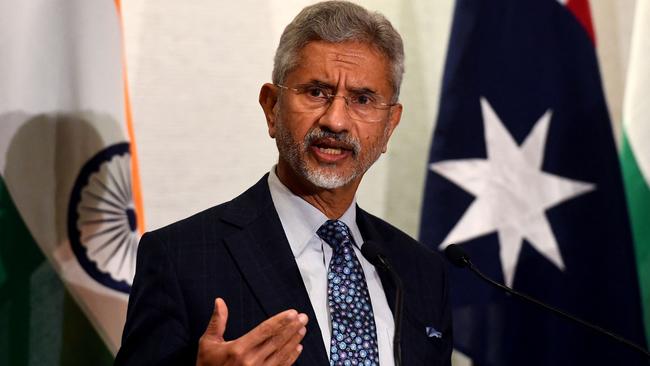Indian Foreign Minister Subrahmanyam Jaishankar condemns Chinese troops on border
Indian Foreign Minister Subrahmanyam Jaishankar has joined his Quad counterparts in making withering public criticism of China in an exclusive interview.

Indian Foreign Minister Subrahmanyam Jaishankar has joined his counterparts in the Quadrilateral Security Dialogue in making withering public criticism of the regional behaviour and aggressiveness of China.
In an exclusive interview with The Australian, Mr Jaishankar said Beijing continued to keep massed troops on its Himalaya border with India in contravention of international agreements.
His remarks follow those of US Secretary of State Antony Blinken, who told The Australian China had the strategic ambition of dominating the world militarily and economically, and Japanese Foreign Minister Yoshimasa Hayashi, who said Beijing’s military buildup and regional actions were of “grave concern”.
In June 2020, in a cross border incident in which New Delhi claims Chinese soldiers advanced across the Line of Actual Control in the Himalayas, as the disputed border is known, 20 Indian soldiers were killed in hand-to-hand fighting with the Chinese.
Mr Jaishankar said this event had a powerful effect on the Indian view of China.
“You can’t have a tense, even violent, border and have a happy and co-operative relationship – that’s common sense,” he said.
“We’ve long had an unresolved border with China.
“From the 1950s we’ve had negotiations. We had the 1962 war, deep problems in 1967, but after 1975 there had been no fatalities on the border.
“That showed that we were talking but managing the situation at the same time.
“The basis of that management was a written agreement that neither side would bring massed forces to the border.
“In 2020 the Chinese went back on that agreement. That was a very profound reversal and led to that incident in which so many people lost their lives.”
Mr Jaishankar said Beijing still has massed forces on the border and “there is no justification for this”.
When asked why China did this, he replied: “You tell me.
“We want an international order that is free from coercion, that respects laws and norms, that is transparent and respects sovereignty and territorial integrity. These are not abstractions. This is not a theoretical debate.”
Mr Jaishankar accused India’s other difficult neighbour, Pakistan, of continuing to support terrorism.
He said: “Frankly, we haven’t seen any serious rethinking on Pakistan’s part of supporting cross-border terrorism. They are training groups and using them against us. It goes on today.
“And it’s not just us.”
Mr Jaishankar said other nations had suffered terrorist attacks from groups sponsored by Pakistan.
In contrast, Mr Jaishankar said India had “an overwhelmingly positive” relationship with the US, including a strategic relationship. The nature of the India/US relationship had changed fundamentally in recent years.
Still, he noted there were some differences: “The US has unique aspects. It is the most powerful nation in the world, with very wide interests. The US is quite a prescriptive polity. That is not our tradition.”
Sometimes, he said, this could lead to the US not necessarily having a good understanding of what was happening in India but overall the relationship had grown closer across five US presidents – Bill Clinton, George W Bush, Barack Obama, Donald Trump and Joe Biden.
Mr Jaishankar also believes that for the first time, the Australia/India relationship can reach its potential. The Quadrilateral Dialogue is part of this.
The Quad, he said, is “four nations who have many shared interests, significant shared concerns, occupy an overlapping shared space and in terms of their way of running society have a shared outlook.
“If they get together to work on the world they not only advance each others’ national interests, but also advance the welfare of the world.”
Mr Jaishankar said India and Australia now share values and strategic interests but that these factors alone did not guarantee a close and intimate partnership.
“You need a leadership choice, a leadership priority,” he said.
He believes that on the Indian side, the outlook towards Australia changed for the better when Narendra Modi became prime minister in 2014.
“Since 2014, you’ve had three Australian prime ministers – Tony Abbott, Malcolm Turnbull and Scott Morrison – and all three have pushed strongly for the Australia-India relationship,” he said.
Mr Jaishankar also reflects on the change in India’s own international personality over the decades. When India became independent in 1947, it related, among Western nations, mainly with Britain and Canada. But its “look east” policy took its gaze more strongly to Southeast Asia, to Northeast Asia and ultimately to Australia, as well as the US.
“India has become an Indo-Pacific country,” he said, “whereas before that we were sort of an Indo-Suez country. Within the Five Eyes countries, the US and Australia began to have greater weight for us.”
Mr Jaishankar says the military to military co-operation between India and Australia has grown in recent years and he would like it to grow more.








To join the conversation, please log in. Don't have an account? Register
Join the conversation, you are commenting as Logout